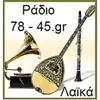Greek traditional Live Radio Stations
Radio Stations
Choose a Genre
Discovering the Soul of Greece Through Greek Traditional Music
Greek traditional music is a profound reflection of Greece’s rich history, culture, and spirit. Originating from various regions across the country, this genre has evolved over centuries, blending influences from both the East and West. Rooted deeply in the historical experiences of the Greek people, the music has a distinct sound characterized by its unique instrumentation, intricate rhythms, and powerful vocals that echo the emotions of love, sorrow, and resilience.
A Blend of East and West: The Origins of Greek Traditional Music
Greek traditional music is a result of centuries of cultural exchange. It draws from the Byzantine and Ottoman empires, incorporating elements from both Eastern and Western musical traditions. This fusion is evident in the melodies and rhythms, which are often based on Byzantine scales and modes, yet influenced by the melodies and instruments brought by Ottoman culture. As a result, the music feels both familiar and exotic, a blend of two worlds that have shaped Greece’s identity.
At the heart of this genre is a range of traditional instruments that define its sound. The bouzouki, with its distinctive sound, is the most iconic instrument in Greek music. This stringed instrument is often accompanied by the baglamas and tzouras, smaller cousins of the bouzouki that contribute to the intricate melodies. The santouri, a hammered dulcimer, adds a percussive element to the music, creating rhythms that resonate with the soul. These instruments, with their rich tones and nuanced play, provide the soundtrack to the lived experiences of the Greek people.
The Heartfelt Lyrics: Stories of Love, Struggle, and Resilience
The lyrics of Greek traditional songs are a testament to the trials and triumphs of the people. These songs cover a vast range of topics, from the joy of love and the pain of heartbreak, to the collective struggles of the Greek people throughout history. Themes of social justice, political resistance, and the quest for freedom are also common. Many of the songs were born from the hardships of life, whether it was the Ottoman occupation, the fight for independence, or the daily struggles of the common folk.
Songs often serve as a storytelling medium, recounting historical events or narrating personal stories of longing and hope. The emotional intensity conveyed through the lyrics, paired with the expressive instruments, makes Greek traditional music a powerful form of cultural expression.
Greek Traditional Music on the Airwaves
In modern times, radio stations dedicated to Greek traditional music continue to play a vital role in preserving and promoting the genre. These stations offer a mix of classic tracks from legendary artists and newer songs from contemporary musicians who are keeping the traditions alive. They provide an important platform for Greek folk music, ensuring that younger generations are exposed to the beauty of their cultural heritage.
These radio stations often feature interviews with musicians, where they share their stories, inspirations, and insights into the creative process behind Greek traditional music. Commentary on the historical and cultural significance of songs and artists is also an essential aspect of these stations, giving listeners a deeper understanding of the music's role in Greek society.
Related Genres: Rebetiko and Laiko
In addition to Greek traditional music, many radio stations that specialize in this genre also showcase related styles, such as rebetiko and laiko.
Rebetiko emerged in the early 20th century as a unique blend of Greek, Ottoman, and Middle Eastern influences. Often associated with the working class and marginalized groups, this genre deals with themes of love, hardship, and rebellion. The music, with its melancholic melodies and deep emotional resonance, offers a raw and honest reflection of Greek society during the early 20th century.
On the other hand, laiko is a more modern style that blends traditional Greek elements with pop and rock influences. Laiko has become a mainstream genre, popular in contemporary Greek music scenes, and it often deals with themes of love and everyday life.
The Role of Greek Traditional Music Today
Greek traditional music remains a vital part of the nation’s identity and culture. Through the preservation of its deep-rooted traditions and the celebration of modern interpretations, the music continues to evoke the timeless emotions of the Greek people. Radio stations dedicated to Greek traditional music are key in keeping this cultural treasure alive. They provide listeners with a connection to their heritage, a window into the emotional landscape of Greece, and an opportunity to celebrate the beauty and depth of this music.
Conclusion
Greek traditional music is much more than a genre—it is a living expression of the country’s history, culture, and people. From the soulful strumming of the bouzouki to the heartfelt lyrics of its songs, Greek traditional music offers an experience that resonates deeply with anyone who listens. Whether you’re tuning in to a dedicated radio station or attending a live performance, this music has the power to transport you to the heart of Greece, immersing you in a culture that has endured and thrived for millennia.
Greek traditional music is a profound reflection of Greece’s rich history, culture, and spirit. Originating from various regions across the country, this genre has evolved over centuries, blending influences from both the East and West. Rooted deeply in the historical experiences of the Greek people, the music has a distinct sound characterized by its unique instrumentation, intricate rhythms, and powerful vocals that echo the emotions of love, sorrow, and resilience.
A Blend of East and West: The Origins of Greek Traditional Music
Greek traditional music is a result of centuries of cultural exchange. It draws from the Byzantine and Ottoman empires, incorporating elements from both Eastern and Western musical traditions. This fusion is evident in the melodies and rhythms, which are often based on Byzantine scales and modes, yet influenced by the melodies and instruments brought by Ottoman culture. As a result, the music feels both familiar and exotic, a blend of two worlds that have shaped Greece’s identity.
At the heart of this genre is a range of traditional instruments that define its sound. The bouzouki, with its distinctive sound, is the most iconic instrument in Greek music. This stringed instrument is often accompanied by the baglamas and tzouras, smaller cousins of the bouzouki that contribute to the intricate melodies. The santouri, a hammered dulcimer, adds a percussive element to the music, creating rhythms that resonate with the soul. These instruments, with their rich tones and nuanced play, provide the soundtrack to the lived experiences of the Greek people.
The Heartfelt Lyrics: Stories of Love, Struggle, and Resilience
The lyrics of Greek traditional songs are a testament to the trials and triumphs of the people. These songs cover a vast range of topics, from the joy of love and the pain of heartbreak, to the collective struggles of the Greek people throughout history. Themes of social justice, political resistance, and the quest for freedom are also common. Many of the songs were born from the hardships of life, whether it was the Ottoman occupation, the fight for independence, or the daily struggles of the common folk.
Songs often serve as a storytelling medium, recounting historical events or narrating personal stories of longing and hope. The emotional intensity conveyed through the lyrics, paired with the expressive instruments, makes Greek traditional music a powerful form of cultural expression.
Greek Traditional Music on the Airwaves
In modern times, radio stations dedicated to Greek traditional music continue to play a vital role in preserving and promoting the genre. These stations offer a mix of classic tracks from legendary artists and newer songs from contemporary musicians who are keeping the traditions alive. They provide an important platform for Greek folk music, ensuring that younger generations are exposed to the beauty of their cultural heritage.
These radio stations often feature interviews with musicians, where they share their stories, inspirations, and insights into the creative process behind Greek traditional music. Commentary on the historical and cultural significance of songs and artists is also an essential aspect of these stations, giving listeners a deeper understanding of the music's role in Greek society.
Related Genres: Rebetiko and Laiko
In addition to Greek traditional music, many radio stations that specialize in this genre also showcase related styles, such as rebetiko and laiko.
Rebetiko emerged in the early 20th century as a unique blend of Greek, Ottoman, and Middle Eastern influences. Often associated with the working class and marginalized groups, this genre deals with themes of love, hardship, and rebellion. The music, with its melancholic melodies and deep emotional resonance, offers a raw and honest reflection of Greek society during the early 20th century.
On the other hand, laiko is a more modern style that blends traditional Greek elements with pop and rock influences. Laiko has become a mainstream genre, popular in contemporary Greek music scenes, and it often deals with themes of love and everyday life.
The Role of Greek Traditional Music Today
Greek traditional music remains a vital part of the nation’s identity and culture. Through the preservation of its deep-rooted traditions and the celebration of modern interpretations, the music continues to evoke the timeless emotions of the Greek people. Radio stations dedicated to Greek traditional music are key in keeping this cultural treasure alive. They provide listeners with a connection to their heritage, a window into the emotional landscape of Greece, and an opportunity to celebrate the beauty and depth of this music.
Conclusion
Greek traditional music is much more than a genre—it is a living expression of the country’s history, culture, and people. From the soulful strumming of the bouzouki to the heartfelt lyrics of its songs, Greek traditional music offers an experience that resonates deeply with anyone who listens. Whether you’re tuning in to a dedicated radio station or attending a live performance, this music has the power to transport you to the heart of Greece, immersing you in a culture that has endured and thrived for millennia.



